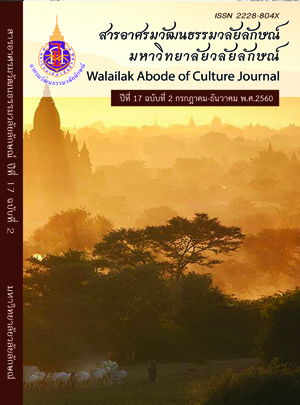อองซาน: ความทรงจำร่วมของแรงงานพม่าในจังหวัดระนอง
Keywords:
อองซาน, ความทรงจำร่วมทางสังคม, แรงงานพม่า, Aung San, Collective Memory, Burmese Migrant WorkersAbstract
แหล่งความทรงจำต่ออองซานได้ถูกสร้าง ผลิตซ้ำ และถ่ายทอดภายในพม่านับตั้งแต่อองซานเสียชีวิต จนกลายเป็นความทรงจำร่วมทางสังคมด้วยสถานะวีรบุรุษแห่งชาติในประเทศพม่า กระทั่งประเทศพม่าได้เผชิญกับภาวะเศรษฐกิจที่ตกต่ำ จนส่งผลให้ชาวพม่าจำนวนมากเคลื่อนย้ายการดำรงชีวิตมาสู่จังหวัดระนอง จังหวัดที่มีการบังคับใช้กฎอัยการศึกและแหล่งความทรงจำต่ออองซานถือเป็นการละเมิดกฎเนื่องจากถูกตีความว่าเป็นการเคลื่อนไหวทางการเมือง แต่แรงงานพม่าเหล่านี้ยังมีการนำแหล่งความทรงจำต่ออองซานเข้ามาดำรงอยู่ในจังหวัดระนอง ทั้งในระนาบชีวิตประจำวัน และวาระพิเศษ
แหล่งความทรงจำต่ออองซานได้ปรากฏในรูปแบบของวัตถุ สัญลักษณ์ และการปฏิบัติการต่อแหล่งความทรงจำผ่านวิธีการต่างๆ จนเห็นลักษณะของการผลิตซ้ำ การถ่ายทอด และไหลเวียนความทรงจำร่วมต่ออองซานบนพื้นที่จังหวัดระนอง ความทรงจำร่วมต่ออองซานของแรงงานพม่ามีสถานะของวีรบุรุษแห่งชาติเป็นแกนกลางในการให้ความหมายแต่ปัจจัยทางการเมืองท่ามกลางบริบทของการเลือกตั้ง กรอบสังคมดั้งเดิมเรื่องนัตและกรอบทางสังคมข้ามพรมแดนที่ผสานความเชื่อเรื่องกษัตริย์ไทย สิ่งเหล่านี้ได้สร้างความแตกต่างด้านรายละเอียดในการให้ความหมายต่ออองซาน แต่ไม่ได้ขัดแย้งกับสถานะวีรบุรุษแห่งชาติของอองซาน ความหลากหลายของบ้านและแหล่งที่มาของแรงงานงานชาวพม่า พบว่าแรงงานพม่าที่มาจากย่างกุ้ง และทวายจำนวนมากมีความทรงจำร่วมต่ออองซานในฐานะวีรบุรุษแห่งชาติตามรูปแบบที่รัฐบาลและฝ่ายต่อต้านได้ผลิตซ้ำเรื่อยมา แตกต่างจากชาวทวายบางส่วนที่มีความทรงจำที่แตกต่างออกไป ความทรงจำต่ออองซานในลักษณะของกบฏครั้งนำพาทหารญี่ปุ่นเข้ามาพม่าผ่านเมืองทวายจนเกิดโศกนาฏกรรม และการที่อองซานไม่อนุญาตให้บะทู ผู้เป็นวีรบุรุษท้องถิ่นของชาวทวาย ย้ายกลับมาทำงานที่ทวาย ส่งผลให้ความทรงจำเหล่านี้ถือเป็นความทรงจำด้านลบและเข้าไปปะทะกับความเป็นวีรบุรุษแห่งชาติของอองซาน
Aung San: Collective Memory of Burmese Migrant Workers in Ranong Province
The sites of memory of Aung San have been constructed, reproduced, and transmitted in Myanmar since the death of Aung San. In consequence, Aung San becomes a collective memory in Myanmar as a national hero. The economic crisis in Myanmar facilitated the migration of Myanmar workers to Ranong province, the hub of migrant workers in Southern Thailand, where the martial law has been announced and the sites of memory of Aung San are prohibited on the ground that they have been viewed as a tool for political movement. However, those sites of memory can be witnessed in Ranong in both daily activities and occasional events of Myanmar workers.
The sites of memory of Aung San appear in the forms of material objects, symbols, and actions in terms of reproduction, transmission, and circulation, in Ranong province. The Myanmar workers’ collective memory of Aung San can be seen as the national hero, which is the central theme for meaning-giving. However, political factors in the context of national election, the traditional belief in a spirit worshiped, Nat, and transnational social framework that associated with the Thai king cause the different memories toward Aung San. For example, some Dawei workers perceive Aung San as a rebel who brought the Japanese soldiers to Myanmar that ultimately caused the tragedy. In addition, Aung San once did not allow BaHtoo, a local hero of Dwail to back his homeland. This becomes the negative memory of Dwail workers whose local hero, BaHtoo, is encountered by the national hero, Aung San.
Downloads
Published
How to Cite
Issue
Section
License
© 2018 by Asian Journal of Arts and Culture, Walailak University. All rights reserved.




